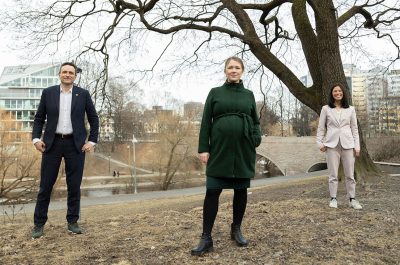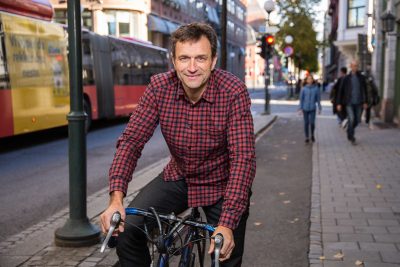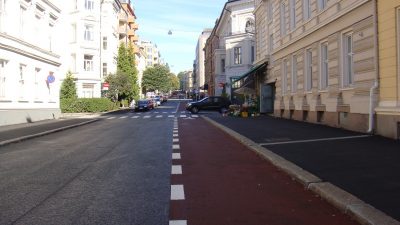NEWS ANALYSIS: Radical politics on both the climate and social fronts have cut the popularity of Norway’s Green Party by more than half in Oslo, arguably its most important election district. As the party gathered over the weekend for its annual national meeting, there was no sign of remorse or worry among party leadership but some in the rank and file are alarmed.

“If we’re going to manage to become a green people’s party, we can’t be wagging a moralizing finger all the time,” Jon Lurås, leader of the party’s chapter in Norway’s large and mostly rural Innlandet County, told newspaper Aftenposten before the meeting began. “We need more carrots (incentives) than whips. We have to get folks with us. Now we’re always ordering them what to do, and I don’t like that.”
RELATED STORY: Leader defends ‘radical’ agenda
Nor do many others especially outside Norway’s urban areas, where rural residents need to drive cars since there’s little if any public transport available. Nor are there enough facilities to charge electric cars. The rural districts are also home to Norway’s powerful agricultural industry, which is heavily regulated, protected and subsidized. One would think farmers would be in favour of a “green” party, but instead they find themselves having to fend off the Greens’ agenda. Many view the party (Miljøpartiet De Grønne, MDG) as a threat to their very existence.
Campaign against meat
Take one of the most controversial, and hotly debated, items at the weekend meeting that ended up winning full party support: Major reductions in the production and consumption of meat in Norway. The Greens’ Oslo chapter wants to cut both by half within the next four years. The Green’s youth party (Grønn Ungdom) wants to forbid all advertising for meat. The party also wants to double Norway’s 15 percent value-added tax on meat, which functions like a sales tax, and impose an extra tax on meat. Beef is their target, but they also want to all but shut down the pork and poultry industries as they currently exist. They cite both animal welfare and the emissions that meat production generates as the reasons.
Ingrid Espelid Wold, leader of the Greens’ chapter in rural Møre og Romsdal, agrees with the intention, but called the proposed methods for cutting meat consumption much too strong and even counter-productive. “They’re way too invasive and can be viewed as moralizing,” Wold told Aftenposten. “We need to have the farmers with us, not against us. Farmers perform important jobs and are important players in the local economy. Many in my county already produce meat in a sustainable manner.”
There were lots of other radical measures and deadlines winning support over the weekend from Greens leaders and the party’s even more radical youth group, if not those in the districts. They repeated their insistence on an end to oil exploration and production by 2035, and a 95 percent reduction in carbon emissions by the same date. Even though they want to slash meat production, they nonetheless demand a degree of self-sufficiency in non-meat food production of 60 percent by 2030. All agricultural production should be fossil-free by 2030, they contend, and the Greens’ youth party wants to phase out all flights between Oslo and Bergen, Trondheim, Stavanger, Copenhagen and Stockholm within nine years as well.
While wind power and the huge turbines needed to produce electricity have blown up protests on the mainland, the Greens want to build no less than 100 offshore turbines to power all oil platforms with electricity, also by 2030. “One of the most important sectors is offshore wind power,” Greens’ deputy leader Arild Hermstad told newspaper Klassekampen on Saturday. He doesn’t seem to care that Norway’s huge fishing and seafood industry is highly skeptical towards offshore turbines, fearing they’ll scare off fish and cause problems for trawlers.

Hermstad argues that all the relatively short deadlines are necessary because the current Conservatives’ led government has “wasted” the last eight years. “We believe the climate- and environmental crisis demands short deadlines,” Hermstad said. “For me the difference between good and bad climate policy is tempo. We believe the climate crisis demands just as much attention and action as the Corona crisis has. In that crisis, we’re rolling out new measures nearly every week.”
Others, including Steffen Kallbekken of the Cicero Center for climate research, worry that the Greens’ short deadlines can actually slow the pace of climate measures. “You need quick changes to reach climate goals, but you can’t underestimate how demanding the restructuring (of building up new business and increasing self-sufficiency to reduce the need for imports) really is,” Kallbekken told Klassekampen. “A tempo that’s too high can unleash public opposition and make it difficult to push through large political projects.”
That’s what seems to be happening already in Oslo, where the Greens suddenly are in trouble. A public opinion poll conducted by research firm Norstat for Aftenposten showed the Greens with just 6.9 percent of the vote last week. That compares to 9.3 percent in the last such poll in October and to the last election results in 2019 of 15.3 percent. There’s no doubt that the wind has gone out of the Greens’ sails in what has been its main bastion of support.
Election analysts cite several years of public indignation over “car wars” involving massive development of bicycle lanes, some of them rarely used, that have come at the expense of parking places that already were at a premium. Oslo residents with cars are also now charged thousands of kroner per year for street parking that’s declined markedly, even in areas where residents are given priority. The Greens also want to tax any free parking at workplaces.

Bicycle lanes have replaced all street parking on both sides of many city streets. Protests have been especially strong along Gyldenløves Gate, long one of Oslo’s most scenic streets that began as a horseback-riding trail for kings and queens from the Palace in Oslo to the area that’s now Frogner Park. Local residents and businesses were furious when informed that all their parking would disappear even though there was room for both pedestrians and cyclists on the Gyldenløves’ wide sidewalks: “No one has asked for bike lanes here,” local resident and musician Claudia Scott told Aftenposten last weekend. “They were forced upon us.”
What really riled even the local district politicians in the area, which voted against the Gyldenløve project by a vote of 13-2, was that they were overruled by the central city government when Labour sided with the Greens and ignored the local vote. “What’s the point of so-called ‘local democracy’?,” Scott asked, when the local vote didn’t matter in the end. A similar situation occurred in the eastern district of Lambertseter, when local residents demonstrated for a year against bike lanes, but the Greens pushed them though anyway.
Scott and others question how green the Greens really are. “What we need is sensible policy and to be heard, not fundamentalism and symbolism,” she said.
Oslo farm dispute
In the scenic valley of Maridalen on Oslo’s north side, however, families who’d farmed city-owned rural property for generations were finally heard after demonstrating for the past several years. The Greens suddenly wanted to put their farm operations out to bid, but the top Greens official in charge of environmental, transport and lots of city planning issues, Lan Marie Nguyen Berg, finally had to back down after massive public protests prompted Labour to change its mind and support the farmers over the Greens. Berg wouldn’t agree to an interview, but sent a statement to newspaper Dagsavisen saying that a decision to ultimately allow farming families preference in connection with a generational shift was “a good solution” after all. It was nonetheless a big defeat for the Greens that further tarnished the party’s reputation.

There also have been massive disputes over the city’s Labour-Greens-Socialist Left government’s failure to regulate electric scooters, its decision to chop down trees to accommodate other bike-lane projects and so-called “outdoor furniture,” and a recent proposal to ban fossil-fueled vehicles entirely in Oslo. The ban, which the Greens wants in place by 2022, would initially apply to the downtown area and gradually expand to encompass most of the city, just like being forced to pay for all street parking has.
Then came more trouble, just last week, when the Liberal Party complained the Greens had not warned them about actual cuts in Oslo’s public transport network. Its operator, Ruter, claims it needs to reduce costs after a sharp drop in ticket revenue during the pandemic for which it hasn’t received enough city and state compensation. Now, reports Dagsavisen, the Liberals fear the cuts will threaten the roll-out of new trams for the city and that some cuts have already been made despite the Greens’ promises of cheaper and better public transport.
Berg insists the cuts were revealed last year in budget documents for 2021 “and I have this week given out updated information on the status.” Berg also blamed a decline in the tolls commuters have to pay to drive into and around Oslo, and which help finance public transport. “Also here has income fallen dramatically,” Berg said, adding that the city “needs that money.” The tolls, however, have been imposed and increased dramatically in recent years to deter people from driving, so Berg and her colleagues should be happy about the reduction in commuting. Instead they’ve come to rely on the toll revenue.
On Sunday Aftenposten reported that the Greens’ ambitious climate goals for Oslo likely won’t be met. New numbers indicate that Oslo is lagging far behind in its lofty ambitions, promoted internationally, to become the world’s first emissions-free large city. Berg’s goals also rely heavily on a carbon capture and storage system at the Klemetsrud recycling and garbage-processing plant that hasn’t secured funding. The city’s plans to ban fossil-fueled vessels also rely on massive charging facilities that require large investment.The Liberals called the Greens’ plans “a bluff,” sparking a furious response from Berg that the Liberals were simply making a “desperate” attempt to restore their own credibility after several years of supporting the state government’s roadbuilding and oil exploration.
All the criticism and conflicts rising around the Greens can help explain their sharp dive in the polls. “What’s interesting,” election research Bernt Aardal told Aftenposten, “is that Oslo has been a model city for the Greens. They have won lots of influence (over the Labour Party, which leads Oslo’s city government) and had high visibility with their environmental and climate measures.” That’s clearly waned.
Now voters in Oslo are turning their backs on them, given their fall from more than 15 percent of the vote in 2019 to less than 7 percent now. Aardal thinks the Greens’ radical policies have also highlighted economic and social differences among people (especially those who can’t afford to trade in their cars on a new electric car) or who simply are not physically inclined to start riding bikes or walking long distances. City officials have, ironically, had to warn against using public transport during the pandemic.
The Corona crisis has also overshadowed most all other issues. Aardal also notes how the Greens lack any of the city government posts that are on the front line of the Corona crisis. They lack visibility at the city’s frequent press conferences, where Labour leads the government and has political control over health and social services, while the Socialist Left is responsible for schools and day care.
Liberalizing drug use, abortion and nuclear power research
On a national level, they’ve now also come out in favour of legalizing cannabis and further liberalizing abortion law. That won’t make them more popular with conservatives and there’s already a split within Labour over drug reform.
On Sunday, even the former leader of Greenpeace Norway, Truls Gulowsen, was critical after the Greens, in what he called a new “shocking development,” voted to support the technology of modern nuclear power plants. Gulowsen is a member of the party’s central board but called the nuclear power vote “surprising, sad and lacking all sense of history.” He said Norway’s Greens had thus become “the only green party in Europe with such an uncritical attitude” towards nuclear power.
Party leader Une Bastholm quickly stressed to new bureau NTB that the party had not voted to promote nuclear power in Norway, only to be positive towards its technology and research into it.
It’s all given rise to concern both within the party and outside it. Erik Solheim, a former high-flying UN official and leader of the Socialist Left party (SV) who served as environmental minister during the last left-center government, has lately been advising the Greens after leaving SV. He now believes a market-oriented “green shift” will be the upcoming national election’s most important issue, calling it an “absolutely necessary restructuring from an oil-based to an environmentally based society.” He still thinks the Greens will play a pivotal role in that, voters permitting.
NewsInEnglish.no/Nina Berglund

